Myelin researcher, UCLA professor George Bartzokis dies at 58

George Bartzokis, a UCLA psychiatry professor known for his visionary research of the myelin sheath, died Aug. 22 at his home in Los Angeles. (Courtesy of Kelly Phelan)
By Julia Raven
Sept. 15, 2014 3:53 a.m.
George Bartzokis, a UCLA psychiatry professor known for his visionary research and fierce compassion for friends and patients, died Aug. 22 of pancreatic cancer at his home in Los Angeles. He was 58.
Friends and family said Bartzokis was ahead of his time in his creative thinking and research. They said he always looked to share what he had discovered with those who would listen.
“His greatest traits were adaptability and flexibility. He wasn’t someone who did things in a conventional way,” said Dr. Kelly Phelan, his wife of 24 years. “He didn’t even know there was a box to think out of.”
The son of two Greek refugees from World War II, Bartzokis was born in 1956 at a refugee camp in Romania. When he was 14, his parents moved the family to Boston with only $100 and bought a pizza shop in Newton, Mass. Bartzokis grew up speaking Greek and Romanian at home, so he taught himself English by watching his family’s black-and-white television and reading their Greek-English dictionary. To help his parents’ business, he delivered pizzas throughout high school and college.
While watching TV as a kid, Bartzokis became a fan of the original Star Trek series. The show sparked his desire to study and use MRI machines after he saw the show’s Leonard “Bones” McCoy use a medical scanning device to diagnose patients, Phelan said.
“(He was) a little bit like Mr. Spock,” said Dr. Mace Beckson, Bartzokis’ fellow researcher and friend who met him in 1986. “Always looking at things and saying, ‘Fascinating.'”
Bartzokis completed his undergraduate education at Harvard College and then attended Yale School of Medicine. He went on to complete his internship, residency and fellowship at the Stewart and Lynda Resnick Neuropsychiatric Hospital at UCLA and later joined the faculty.
At UCLA, Bartzokis dedicated his career to studying the effects of myelin, a white sheath that insulates nerve fibers in the brain. Specifically, he researched how the deterioration of the sheath affects schizophrenia and Alzheimer’s disease.
A struggle to acquire research funding at the beginning of his career prompted Bartzokis to work until he could prove himself and that his theories were true, but it was his creativity to think of novel ideas about the effects of the myelin sheath that set him apart, Phelan said.
Beckson said he thought Bartzokis’ research was about 10 to 15 years ahead of his time and that the myelin sheath had not been examined before as a leading cause in Alzheimer’s and schizophrenia.
“They had never heard of what he was doing before and thought he was either a genius or a crackhead,” Beckson said. “A lot of his thinking has become more mainstream now.”
Beckson said Bartzokis had a thirst for knowledge and worked tirelessly to find cures for and causes of Alzheimer’s and schizophrenia. He said Bartzokis did so without obsessing over fame and instead cared most about helping individuals in need.
“His motivation was not to become famous or climb the academic ladder. He wanted to learn things and discover things that could be used for the good of mankind,” Beckson said. “His interest was in alleviating suffering and everything in his professional life was geared toward that.”
While Bartzokis was a leading researcher in his field, he was also known for making sure to take care of those around him, said Todd Tishler, a postdoctorate who worked in Bartzokis’ lab.
Tishler said Bartzokis would go out of his way to discuss coworkers’ professional and personal needs and would extend the same warmth to his patients and research subjects by introducing himself when they came in for MRIs. He would also engage research assistants in “questions of the week” and provide them with plenty of dark chocolate.
Before Bartzokis announced he would be leaving UCLA because of illness, Tishler said he recalled a conversation in which he and Bartzokis talked about how far Bartzokis’ research had come and where it would go.
“Earlier this year, I said to him that I wished he had a time machine so he could jump forward hundreds of years to see the effect of his research,” Tishler said.
But Bartzokis knew his work at UCLA had already begun to help people and was gaining attention in the scientific community, Tishler said.
Tishler recalled that Bartzokis had told him that even without the time machine, he could already see that things had happened and that they had an effect and a benefit.
Bartzokis is survived by his wife, two daughters and mother. Services were held on Sept. 1 at the St. Sophia’s Greek Orthodox church.
Donations can be made to the UCLA Foundation for the George Bartzokis Fund for Innovative Research, which has been set up to support researchers who – like Bartzokis did – struggle to acquire funding for their ideas.


